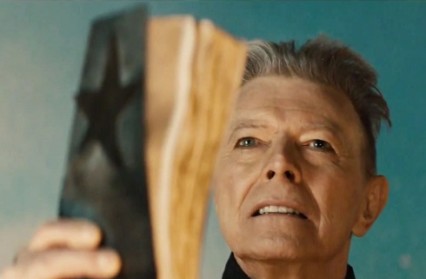Gray Taylor reviews David Bowie’s Blackstar album, the sound of a very important artist reinvigorated by his own song-writing.
Deciding to return ten years after a self imposed exile, David Bowie in 2013 was the talk of the year, the Man of the Year, the Prettiest Star, the model of graceful older rocker, the fashion-maker reborn effortlessly with his touring wardrobe conquering country after country, influence incarnate. Amongst all the full-throttle screaming madness, at the centre of it all, was an excellent album, The Next Day, that laid out Bowie’s creative palate like a proud seller at an antiques fair. It sounded great, it had some odd attempts at first person reportage, it had some marvelously catchy tunes, and a scattershot approach to it’s theme, although Bowie seemed to be raging occasionally. Very little was missing, it was a great comeback, it still is, albeit lacking perhaps the longevity of the best of Bowie’s work.

A year later a full fifty year career retrospective was released, Nothing Has Changed, supposedly personally selected by the man himself and run in reverse chronological order. I say supposedly because the collection seemed pretty basic and non-essential; the odd unreleased track from 2000’s unreleased Toy album, some early gems that the casual admirer would have been interested in, but by-and-large it was the familiar old singles, same old thing in brand new drag. The most tantalising element of this compilation was a new track, “Sue (Or in a Season of Crime)“, which seemed to be the album’s sole purpose for being, to show the journey from R ‘n B hopeful all the way to avant garde jazz man. The track baffled many, but fans were excited that the experimental spaceman they had fallen in love with may have returned to earth with new messages and ways of living and thinking. The excitement was doubled when the track was released as a limited 12” single backed by another new song, “Tis A Pity She Was A Whore“, a solo demo that lurched and slashed at the listener in a vicious attack on the senses. It tempered the long jazz improvisation of “Sue” perfectly, the result of a lengthy jam with the Maria Schneider Orchestra, obtuse lyrics seemingly about a relationship brutalised by life’s events, sat beautifully with the Mingus-esque rampage underneath, with Bowie in his best voice, powerful and dramatic. The b-side again seemingly touching on the more dysfunctional side of relationships and with the best opening line I’ve heard in years: “Man, she punched me like a dude”. Both tracks have been re-recorded for the new album and, maybe now for the detractors of those tracks, they make perfect sense.
Perhaps the first thing you notice about the album is the number of tracks. This is no attempt to fill up the running time of a CD, an issue many albums have had since it became a popular medium. Seven tracks, allowed breathing space, allowed time, hallowed time. The opening title track was premiered late in 2015, with an extraordinary video directed by Johan Renck, it surprised many with the depth it went. Ten minutes of electronica, saxophone, and an impressively obtuse but catchy vocal, the sound of space. Could this be the gift Major Tom found beyond the last stratosphere? Are you comfortable? Not for long, slowing mid song, “Blackstar” takes a dark turn, Bowie playing multiple characters, each with their own themes, and their own plays, revealing little to one another. It’s a stunning multi-faceted song, recalling eastern motifs and seemingly harbouring a dark vision; is the blackstar judgement day itself delivered by a prophet? Or an idiot extremist terror organisation disguising their cowardly, apocalyptically perverse vision of a world in chaos as religion? Musically it is reminiscent of the title track from 1976’s Station To Station and is as good, proving that Bowie, although fantastic with a three minute ditty, is at his best when allowed to be more expansive. Absolutely thrilling in all the right ways.
The first three tracks, which represent the first side of the vinyl, are as good as any side of any Bowie album. Up next the re-recorded “Tis A Pity She Was A Whore”, which has lost a lot of the manic urgency of the demo, but is still nevertheless hypnotic, Bowie’s vocal much more committal and the new sax parts revealing a classic Bowie melody; and those lyrics, daring and powerful, almost channeling Lou Reed’s spirit in lines like: “Black struck the kiss, she kept my cock”. And to top it all off some brilliant backing harmonies that elevate the song in the same way this singular talent for harmonising has elevated songs before it.
Track three is the title song and comes from Bowie’s musical, Lazarus. The musical starring good guy serial killer Dexter telling the story of the man who fell to earth really doesn’t matter here. This slow meditation is musically reminiscent of late ’90s Sonic Youth, until it hits a classic Bowie chord progression played on saxophone. The presence of a musical is perhaps a red herring because, almost certainly, Lazarus here is Bowie. Always quick to dismiss his best first person narration as playing a character, it became clear later that Major Tom’s detachment from the Earth was in fact Bowie’s disconnection and feeling of alienation and Ziggy’s lust for stardom was pretty much Bowie’s lust for stardom. Lazarus could be Ziggy arriving in New York in 1972, head full of booze and class b drugs, ready to take over the world from the top of it, a kind of retrospective diary entry with all the pain and disillusionment that time affords. Stunning subtlety and avant juxtaposition, by the time you’ve heard these three tracks, you too are living like a king. The sheer depth of information and vision on the first half is so extraordinarily affecting that you actually feel sorry for the rest of the album.
As if Bowie knows this, side two could be seen as more traditional song-writing, albeit in a Bowie way. A re-recorded “Sue” is up next and takes on a more muscular rock jazz form, it’s a great bit of left-of-centre rock; but it is no improvement on the longer expansive jazz of the original, and that would have suited the album better. That’s not to say that this isn’t a fascinating song, and is perhaps one of the best examples of where Bowie can go as an artist when relieved of the safety net of his usual safe-pair-of-hands touring musicians. Here he is challenged by the musicians and throughout the record this inspires some of his best vocals in years.
The three songs that complete the album seem to form a trilogy-of-sorts. The lyrics are somewhat impenetrable and up for all sorts of interpretation. “Girl Loves Me” features the repeated line “Where the fuck did Monday go?” and represents a plod of banality you suspect Bowie has never had to deal with. The atmospherics of this track retains a strange electronica that permeates the whole record. Quite delicious.
“Dollar Days” is a beautiful piece of song-writing and reminds us that for all the wild experimentation and new language that he has introduced the world to, Bowie is at heart a great song craftsman. It’s sounds a bit like Pink Floyd, it has that classic Bowie approach to chords, and actually had Bowie made records in the late ’80s like Talk Talk in their Spirit Of Eden mode rather than Tin Machine albums, he may well have hit this type of stride earlier. A lovely song that brings the alien back to loving the old England of Ray Davies, but with a rather back-handed compliment; “If I never see the English evergreens I’m running to / It’s nothing to me / It’s nothing to see”.
Staying with nostalgia and the late eighties, closing track “I Can’t Give Everything Away” begins with a harmonica reminiscent of “Never Let Me Down“, perhaps one of his most underrated songs from a period that most prefer to ignore. It’s a beautiful if slight closing track, compared to what has preceded it, for an album that takes you through a surprising amount of information in only seven cuts.
Like all Bowie’s best work, Blackstar demands you listen again and again. I’ve listened to the album six times and I’m still non-the-wiser about much of it’s lyrical content, but it has completely captivated me. Where The Next Day was immediate but now sounds strangely dated, Blackstar is a trickier beast, with gnashing teeth and nail polished claws, and I suspect this gem will remain relevant much longer than Bowie’s output of the last thirty-odd years. This is the sound of a very important artist reinvigorated by his own songwriting, the musicians around him, and, of course, Bowie’s most important collaborator, producer Tony Visconti, who can produce Bowie records so perfectly, regardless of the style Bowie commands, you wonder why he has ever worked with anyone else. A beautiful sounding, fascinating record, of real depth and purpose like the all best Bowie albums before it.
Gray Taylor is a regular contributor to Wales Arts Review.











